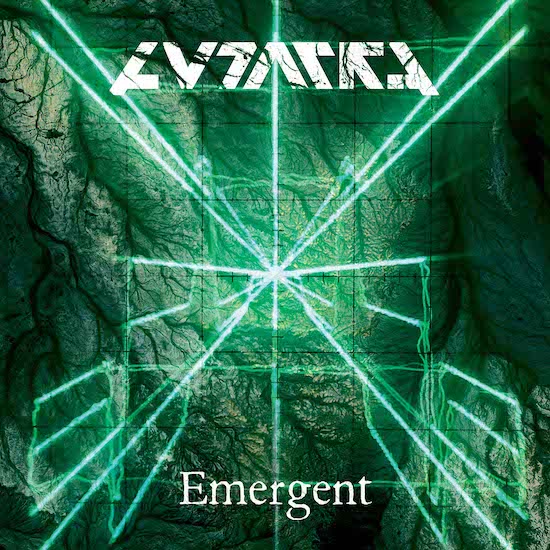
(In the following review our writer DGR takes a deep dive — a very deep dive — into the strange musical worlds created by the Dutch band Autarkh on their new album Emergent, which is set for release on November 10th by Season of Mist.)
One would suspect that a band like Autarkh are going to feature on heavy metal websites more due to their ethos of being as experimental and unapproachable as possible than their particular chosen instrument configuration. The wildly artistic group were founded on blurring multiple genre lines, and that includes the world of heavy metal, with large handfuls of other things – difficult to describe as they may be.
The group’s sophomore album Emergent walks further down that pathway, metal not just because the band like themselves a distorted guitar, or their history as being a branch budded off the tree that was Dodecahedron, or the fact that they’ve done a drone/doom set at the more high-minded world of Roadburn under the name Autarkh III – as far as I know, there is no Autarkh II: Autarkh Takes Manhattan out there just yet – but the band will also likely grab ears among metal’s crowd due to their usage of it as a style to further accomplish whatever strange and haunted otherworldly goals they may have had in mind.

Photo Credit: Joris Robben Photography
It is even safe to say that the Autarkh that exists on Emergent is not the same Autarkh that existed on Form In Motion. The group are dogged in their mission to have releases remain distinct from one another, and though the lineup may or may not have shifted much in the time since, Emergent is a surprisingly different album from Form In Motion, as if the band have emerged from their own cocoon as a wholly different yet equally challenging creature.
Autarkh‘s approach to their second full-length is interesting, as it plays with musical themes likely familiar to people who’ve had a long history with the world of industrial. The band’s musical approach shares little with the likes of the quicker-moving participants in the genre – sorry Ministry crew – but often seems obsessed with being lost within the realms of the digital, musically distorted with an eerie voice that rises above the band themselves.
They make themselves more clearly understandable than in the abrasive world of Form In Motion but that doesn’t mean there’s a joyous atmosphere or catchy hook to be found. Instead, fans of projects like Author & Punisher, The Algorithm‘s more off-kilter songs, Herod‘s recent release via Pelagic Records, or Godflesh‘s long impetus of grinding listeners up in the gears of repetition are going to find a comfortable place to nest within the worlds of Emergent.
Even while being one song less than Form In Motion, the journey of the album still seems to leave the same sort of shuddered impact where by the end of the first couple of listens you’re not entirely sure what it is that just approached you, so much that it was equally bizarre and interesting.
Let’s face it, while ‘challenging’ may be the word of the day, it is not because we’re recommending something due to the fact that it takes your ears off and mails them to you stapled to a postcard, but more because the strange nature of the creature that is Autarkh moves musically in ways that will challenge you to figure out exactly what they are doing. Sometimes, almost antagonistically, it will seem like right when you’re able to put a pin in why you’re enjoying a particular segment of Emergent, Autarkh propel themselves off in a completely different direction with a joyous abandon.
Credit to the Netherlands crew here: though Emergent is a strange beast of mostly four-to-seven minute songs – there’s a one minute forty second outlier in the mix for those who find joy in numbers – you can always let your attention drift and come back to it and find something ‘interesting’ happening almost every time. A full, completely locked-in experience is just as intense as the first go-around, though this time it feels like your brain is just as likely to burn out on scrutinizing things than it is because of the sort of hammering synth/drum combo that Autarkh consider a staple.
There’s more room for guitars here, and vocalists Michel Nienhuis and David Luiten fling themselves around with a wild abandon. In some ways it can feel strangely ‘positive’ on Emergent simply because there’s not as much harshness happening on the vocal front, and musically, guitars and bass warble and jangle as much as they are distorted and used for the occasional bludgeoning. Much of the actual hefty sort of hammer slamming into pavement sound comes courtesy of the aforementioned beats and synth combo. It’s still arguable to say that Autarkh‘s musical explorations could play out as fully catchy but certain songs from Emergent do have a nasty habit of hovering around the brain stem anyway.
“Strife” serves a good example of how Autarkh are prodding at their musical boundaries. The song itself a sort of woven-together mess of intense vocals and wild melodic lines that insists on tying itself into further and further knots over five minutes. Its opening bit starts out quiet enough and seems like the bass guitar is taking the spotlight but the song launches in wild directions over that time. It is one of the heavier encapsulations of Emergent as a whole with fellow single “Refocus” being one of the others. Neither of which is hinted as even being on the table by the more sing-song approach of a song like “Open Focus” that opens up Emergent.
That song sways back and forth on its vocal line and is one of the longest on there. When Autarkh make it a mission to traverse across wide fields, “Open Focus” is more the example, as it seems like everyone is given free reign to get as off-the-wall as they can, leaving few things to hold onto along the way. “Strife” immediately following up on that would almost be an act of grounding the band before their ambitions get too lofty, were it not for the part where “Strife” dives equally headlong into an artistic abyss.
“Dukha”, then, seems like a wildly violent voice screaming from within static by comparison. It’s tempting to recommend that one to many folks, mostly because it’s one of the songs where it feels like Form In Motion‘s DNA is still present and being expounded upon. The true tear-your-head-off ass-kicker of Emergent is probably going to be awarded to “Trek”. After three songs of haunting vocals, strange and uncharted pathways, and “Dukha” and its screaming madness, “Trek” is fairly traditional by just picking that baton up and hammering on everything. “Trek” ratchets up the intensity for its opening moments before Autarkh lean heavy into melodic worlds again.
Emergent ends in strange places, high-minded and explorative as Autarkh want them to be. “Aperture” is a fun minute and forty long second experiment with sound loops that could emerge as backround music in a haunted house – though the breather is strangely appreciated after five songs of Autarkh piledriving their instruments into the ground and calling it music. Though who would we be to deny Tijnn Verbruggen a chance to create stranger and stranger loops before “Eye Of Horus” goes wildly prog-rock for much of its run time. Fewer stringed acrobatics and more jumbled beats and guitar work that pulls lead work out of the ether, leaving the rhythm section just as mixed up and hanging on.
“Eye Of Horus” jumps around with the quiet and loud dynamic, which at the very least even us knuckleheads at this corner of the internet could recognize. Not quite our usual car-engine over blastbeats that we’re used to but equally fascinating. It would feel unfair to praise a band like Alkaloid for playing around with being weird and ‘artistic’ – for lack of a better term – without giving Autarkh an equal amount of accolades for being willing to take us on just as strange a journey for almost forty minutes.
“Ka” will likely win the battle for best opening segment though, taking much of the constant hammering, pulsating, and percussive beat work that opens many of Autarkh‘s songs and expanding upon it even further. If you liked “Strife” and its bassist/drum-heavy combo for the main backbone of the song, closing song “Ka” gives you another six minutes of iridescent guitar work and glass-cracking bass guitar rumbling for six minutes. Also, you’ll be very used to the incredible high notes that Autarkh hit on the vocal front by this point because they do love the super-haunted and strained vocal pattern to make things like using sandpaper as an aftershave.
Emergent is adventurous. That much is true and could go without saying. Is it a friendly album? Not one bit. Nor could we even pretend to understand a third of what Autarkh are trying to do other than understanding that they find a ton of joy in contorting music into unrecognizable forms and challenging people to find something to ‘like’ within whatever twisted structure emerges.
There’s plenty to dig into across Emergent if you like thundering drums and synth work that is equally loud; those two dominate much of Autarkh‘s structure on their sophomore album. Vocals and guitars actually take a little bit of a back seat this time, though there never seems to be any sort of argument among the band as to who should dominate the mix. Many of the moves across the soundboard are purposeful and there’s spotlights shined on them throughout. Emergent does exist as a challenge to people and that’s part of what makes it fascinating.
Autarkh are two albums in – three if you count the Roadburn reinterpretation of their work, which could be argued as being its own thing – and both are auditory adventures/nightmares in their own right. If you have a lot of interest in groups whose modus operandi with music seems to be breaking it or pushing it to the brim of recognizability, Autarkh‘s Emergent will be one to keep an eye on.
https://autarkh.bandcamp.com/album/emergent
https://redirect.season-of-mist.com/AutarkhEmergent
https://orcd.co/autarkhemergentpresave
https://www.facebook.com/Autarkh

Amazing album. It almost moved me to tears at a couple points.